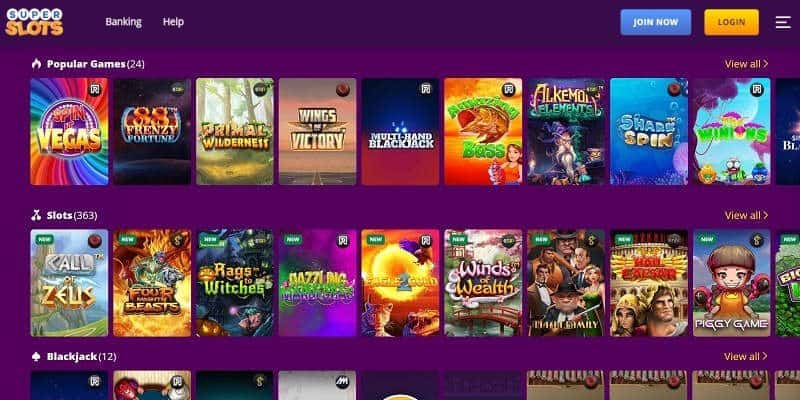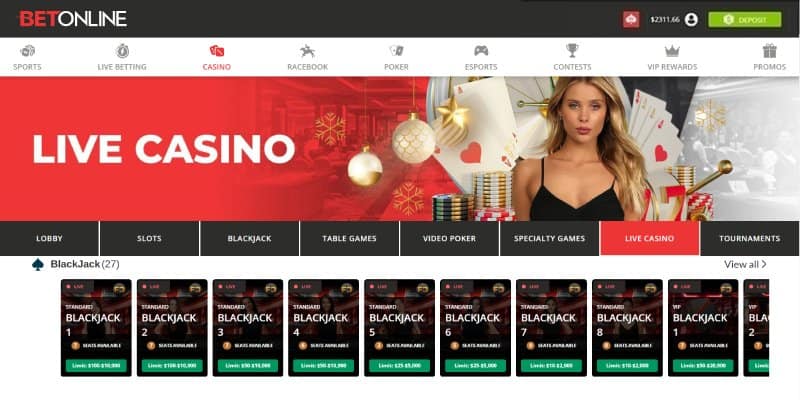
The best Maryland online casinos are working hard to deliver modern games with advanced features, fantastic bonuses, seamless mobile gameplay, and secure transactions.
Slots of Vegas has just the right formula for making MD online players happy. The $2,500 welcome bonus, its superb slots, and the classic casino games are just one part of the equation.
Read this complete guide to learn what makes Slots of Vegas the best MD casino and find other promising Maryland online gambling sites.
Best Maryland Online Casinos
| Slots of Vegas | Best overall – $2.500 bonus + 50 spins |
| Super Slots | $6,000 welcome bonus |
| BetOnline | No.1 crypto casino |
| Highroller Casino | Fastest payouts |
| Raging Bull Slots | Top pick for online slots |
Heads up about our links! Adblock might get confused, so please disable it if you have any issues.
Let’s explore the world of online gambling MD has to offer, and who knows, maybe you’ll discover a Maryland online casino that tops Hollywood Casino Perryville in this guide.
Are Online Casinos Legal in Maryland?
As of now, online casino gambling remains illegal in Maryland. Despite legislative efforts in 2024 to legalize MD online casinos, no bills were passed, and therefore, online casino gaming is not permitted in the state.
In March 2024, the Maryland House of Delegates approved House Bill 1319 (HB1319), which aimed to legalize online casinos. The bill passed with a vote of 92-43 and moved to the Senate for consideration. However, the Senate did not advance the bill before the legislative session concluded in April 2024.
The failure to pass HB1319 means that the legalization of online casinos in Maryland would require new legislative action. The earliest opportunity for such legislation to be reconsidered would be in a future session, with potential implementation not feasible until at least 2026.
Status of Maryland Online Casinos
Maryland permits land-based casino gambling at spots like Horseshoe Casino and Ocean Downs Casino, but has not yet legalized real money online casino Maryland sites. Recent legislative efforts aim to address this.
| Are Maryland Casinos Legal? | Yes (Only land-based) |
| Are Online Casinos Legal in MD? | No |
| Recent Legislative Efforts | House Bill 17 introduced in January 2025 |
| Legal Gambling Age | 21+ years old |
1. Slots of Vegas – Best Maryland Online Casino Real Money Site

Pros:
- 250% new player signup bonus
- 190% signup bonus on all games
- Over two dozen active promos
- Low wagering requirements
- Instant play casino games
Cons:
- No online sportsbook
- Limited e-wallet options
Launched in 2014, this casino has attracted Maryland gamblers for almost a decade – keep reading to find out what makes it our #1 pick today.
Bonuses and Promotions: 4.9/5
As a new user, you can deposit $30 or more and become eligible to receive a 250% bonus on slot games and keno games. If slots and keno games aren’t your cup of tea, you can enjoy a 190% signup bonus with all playable games on Slots of Vegas.
Additionally, you can check the Promotions tab frequently to find more bonuses that might suit you! There are over 30 active bonus codes that you can redeem at the best Maryland online casino. Most are bonus spins for specific slots, but you’ll find other promotions intended for other casino games.
Variety of Casino Games: 4.9/5
Don’t let the name Slots of Vegas fool you. This online MD casino offers diverse genres, including online slots, classic tables, video poker games, and specialty options.
The most popular games now include Samba Jackpots, Jackpot Saloon, and Great Temple.
We believe this Maryland online casino gambling site is a wonderful place to play your favorite games and discover new titles. However, please note that this Maryland casino does not have online sportsbooks and online sports betting options.
2. Super Slots – Best Maryland Online Casino Bonuses

Pros:
- 300 free spins welcome bonus
- Regular casino tournaments
- 1,000+ slot machines
- Live casino games available
- Game library updated frequently
Cons:
- High fees for some withdrawal methods
- No phone support
Super Slots has become one of the most famous Maryland online casinos in recent years. It’s also quite popular in other states, ranking among the best FL casino sites. Offering up to a $6,000 welcome bonus, various reload promos, and regular tournaments, it’s our top pick for the best Maryland online casino bonuses.
What’s even more interesting is that it’s not just popular in Maryland. It’s also recognized as one of the best New York online casinos for playing slots.
Bonuses and Promotions: 4.95/5
This Maryland online casino offers welcome bonuses and other exciting promotions. New players are eligible for a welcome bonus when they make their first deposit.
The welcome bonus provides 300 free spins. You get 30 spins each day for the first 10 days, so you have something exciting to look forward to each time you log in.
The casino also has diverse bonuses, which are updated frequently. You can check the Promotions tab occasionally so you don’t miss out.
Variety of Casino Games: 4.85/5
If you love to play online casino games while discovering new titles at online gambling Maryland sites, Super Slots has got you covered. You’ll find online slots, table games, video poker, and more in its diverse casino game library.
Some popular games include Golden Dragon Inferno, Golden Fangs, Trinity Reels, and others.
You’ll also discover newer games here, like Back to the 60s, Screaming Chillies, and Vegas Aces.
Claim your 300 free spins welcome bonus
3. BetOnline – Best Maryland Online Casino for Live Dealer Games

Pros:
- 100 free spins for new players
- Wide range of live dealer games
- Dedicated mobile poker app
- Daily poker tournaments
- Excellent crypto reload bonuses
Cons:
- Some payment methods come with fees
- Simple website design might not appeal to all
BetOnline has been a trusted name in the Maryland online gambling industry since 2004. It offers a well-rounded experience with a casino, sportsbook, and poker room all in one.
Fun fact: BetOnline is also one of the best California casinos online.
Bonuses and Promotions: 4.6/5
BetOnline knows how to welcome new players with a strong bonus package. Upon signing up you get an awesome bonus of 100 free spins.
For regular players, BetOnline offers a variety of ongoing promotions. You can benefit from weekly 10% cashback on casino losses, crypto reload bonuses, and daily poker tournament rewards.
Variety of Casino Games: 4.7/5
This MD online gambling site is packed with over 400 high-quality casino games, making it a solid choice for players looking for variety. Slots take up the largest portion of the game library, powered by industry-leading developers like Betsoft, providing top-notch graphics and engaging gameplay.
Live dealer fans are in for a treat, as this Maryland online casino offers an impressive collection of live games, including over 30 poker variants, 20 blackjack games, and multiple roulette and baccarat tables. If you prefer classic table games, you’ll find plenty of options to enjoy, from single-hand blackjack to European roulette.
If you want to take a break from casino games, you can also bet on sports at BetOnline, offering competitive odds on everything from NFL and NBA to international soccer and eSports, also making it one of the best Texas online sportsbooks.
4. Highroller Casino – Fastest Payouts of All Online Gambling Maryland Sites

Pros
- 300% crypto welcome offer
- Payouts within 24 hours
- 600+ slots & table games
- Accepts over 15 forms of crypto
- Big payout limits
Cons
- Fees on wire transfers
- Visually busy website
High Roller Casino makes no apologies for catering to big spenders, and they reward high rollers at every turn. With this Maryland online casino, you will get the fastest payouts around.
Bonuses and Promotions: 4.5/5
This Maryland online casino gambling site offers a great deal for cryptocurrency users with a tiered welcome bonus that boosts each of the first three deposits: a 300% bonus up to $1,000 on the first, 200% up to $1,000 on the second, and 100% up to $1,000 on the third.
For those using traditional payment methods, there’s an option between a 400% bonus up to $4,000 or a 200% bonus up to $4,000, each including 100 free spins on a popular slot game.
Beyond the initial offer, Maryland online casino players can claim a 100% bonus of up to $1,000 on their next four deposits, rounding out a generous package that can reach up to $8,000 plus 100 free spins.
Variety of Casino Games: 4.7/5
This Maryland online gambling site features 560+ classic slots and 50+ progressive jackpots from Betsoft, DGS, and Rival Gaming – an impressive selection indeed.
If you prefer skill games, their live casino offers over 70 options. There are 20+ blackjack variants with VIP tables with up to $20k limits. The selection also includes 9 baccarat tables, 15 roulette wheels, 15 scratch cards, and 16 other specialty games.
5. Raging Bull Slots – Best Slots Variety of All Online MD Casino Sites

Pros:
- 250% welcome bonus with 50 free spins
- 200+ RTG slots
- Hosts regular tournaments
- Fast crypto payouts
- Mobile-friendly casino
Cons:
- No online sports betting
- Design could be better
Launched almost a decade ago, Raging Bull Slots has had over a decade to master the art of online gambling in Maryland. Now housing nearly 300 casino games, this online casino is the top slot site overall.
Bonuses and Promotions: 4.7/5
You can get a 250% first deposit match bonus here – and in addition, you’ll also receive 50 free spins. Simply use the promo code SMART250 to activate this offer.
And that’s just the beginning! Make sure to go back for more at this MD online gambling site so you do not miss out on the latest promos.
Variety of Casino Games: 4.75/5
This Maryland online casino offers new games that you can try out on the desktop and mobile versions of the website, in addition to the wide variety of classic slot machines everyone enjoys.
We found over 200 RealTime Gaming titles here – RTG is a very famous provider, and it guarantees the best quality when it comes to online slots. Some of our favorite games here include Empress Wu, Cash Bandits, Paddy’s Lucky Forest, Enchanted Garden, and more.
You can also play various table games at this Maryland online casino gambling site, including unique variants like Blackjack + Perfect Pairs, Tri Card Poker, and more.
Score your $2,500 welcome bonus
Best Maryland Online Casino Sites – Our Ranking Criteria
To provide players with an amazing gaming experience, we considered several aspects when ranking the top Maryland online casino gambling sites.
Bonuses and Promotions
Players interested in betting promos or online casino bonuses will find a variety of options available at these top sites.
These Maryland online gambling sites go above and above to reward their customers, offering huge welcome bonuses, frequent promotions, and loyalty programs.
Casino Games
To have a truly memorable gambling experience, a Maryland online casino must offer a diverse selection of games. The best Maryland online casino sites featured in our article provide various games to accommodate different player tastes. You can find everything here, from traditional slot machines to well-liked table games like blackjack and roulette.
Deposit and Withdrawal Methods
It is crucial to consider the supported deposit and withdrawal options when selecting a Maryland online casino. To ensure seamless transactions, the best Maryland online casinos provide a range of quick and secure banking alternatives.
You have various practical choices, including credit and debit cards, e-wallets, and cryptocurrencies. These real money online casinos in Maryland prioritize player protection and use the most recent encryption technology to safeguard your money and personal data.
If you want to further speed up your withdrawal times, you can check out the best Bitcoin casinos on the market.
User Interface and Mobile Compatibility
A great online MD casino must offer a user-friendly interface and mobile compatibility. The top Maryland online casinos in our list excel in this area, providing intuitive website navigation and mobile-friendly platforms.
Whether you’re enjoying a game from the comfort of your home or exploring online casinos in Virginia during your travels, the best casino websites ensure a consistently enjoyable and convenient gaming experience on your mobile device.
Customer Support
Our selected Maryland online casinos offer outstanding customer service, with 24/7 support through various channels like live chat, email, and phone. Quick response times and knowledgeable support teams ensure that any issues you encounter are swiftly resolved.
Security and Fairness
From the world-renowned casinos of Nevada to trusted online gambling platforms in Georgia, our commitment to recommending safe casinos remains the same, and Maryland is no exception.
The best Maryland online gambling sites that we recommend use state-of-the-art security measures, including SSL encryption, to protect player information. They also undergo regular audits by independent agencies to guarantee fair play, providing peace of mind that the games are unbiased and trustworthy.
Maryland Online Casinos – Gambling Legalization Timeline
Lawmakers have been steadily debating how to regulate Maryland online casinos, from sweeping legalization proposals to targeted crackdowns on unlicensed operators. Below is a quick timeline highlighting the most recent key legislative milestones shaping the future of iGaming in the state.
June 2025 – Introduction of HB 17 (Internet Gaming – Authorization and Implementation): Delegate Vanessa Atterbeary reintroduced HB 17 to legalize online casinos for residents 21+. The bill proposes licensing tied to existing casinos, a $1 million fee, a 15% tax, strict consumer protections (cybersecurity, age checks, self‑exclusion), and earmarks revenue for education and problem gambling. A statewide referendum would be required.
April 2025 – Sweepstakes Ban Fails in House Before Session Ends: Despite Senate approval, SB 860 was never brought to a House vote before adjournment, effectively killing the measure for 2025. The Lottery retained enforcement via cease‑and‑desist letters.
March 2025 – Senate Passage & House Hearing on SB 860: Senate Bill 860, sponsored by Sen. Corderman, passed the Senate unanimously, banning unregulated sweepstakes-style “social casinos.” It empowers the Maryland Lottery to revoke licenses of violators. The House Ways & Means Committee held a hearing later in March.
January 2025 – House Hearing on HB 17 Sparks Industry Debate: A February hearing on HB 17 drew support from online gaming advocates and opposition from casino operators worried about lost foot traffic. Lawmakers added credit-card funding bans and stronger problem-gambling safeguards.
January 2025 – Introduction of Competing iGaming & Sweepstakes Bills: SB 340, refiled by Sen. Ron Watson, proposed online casino legalization via referendum, aiming for $1.65 billion in revenue. SB 860, the sweepstakes ban companion bill, was also introduced.
Online Maryland Casinos VS Land-based Casinos
The gambling market in Maryland offers something for everyone, from sleek online casino platforms to the lively atmosphere of physical casino floors.
As online gambling continues to expand in the state, many players are weighing the pros and cons of playing online versus visiting a land-based casino. Each offers its own kind of appeal, depending on what kind of gaming experience you’re looking for.
Online Maryland Casinos
Online casinos in Maryland are all about convenience and flexibility. With just a few clicks, you can access hundreds of games, from slots and blackjack to live dealer tables, anytime and anywhere within state lines.
Another major draw of online gambling in Maryland is the range of bonuses and promotions. The best Maryland online casino sites regularly offer welcome bonuses, free spins, cashback, and loyalty rewards that you simply won’t find in a land-based setting.
On top of that, the best online casinos in Maryland often let you try games in demo mode before wagering real money, a great way to explore new titles risk-free.
Land-Based Casinos
Maryland’s brick-and-mortar casinos bring something that online platforms can’t fully replicate: atmosphere.
There’s also the ability to cash out winnings on the spot, as well as access to in-person promotions, exclusive tournaments, and VIP events. But land-based casinos come with trade-offs: you need to factor in travel, crowds, and operating hours, all of which make spontaneous or frequent play more challenging. For many, though, the social side and immersive environment make it well worth the trip.
Why Is Slots of Vegas the Best Maryland Online Casino?
Slots of Vegas has quickly become the go-to online casino gambling site for Maryland residents, thanks to its awesome features:
Impressive Game Selection: Slots of Vegas sets itself apart with a large number of casino games. Maryland players can choose between slots, online poker, and other table games, ensuring they are never bored here.
Generous Rewards and Promotions: The best Maryland casino app excels in recognizing and rewarding its players. The casino consistently delivers sizable welcome bonuses and regularly updated promotions.
Ease of Navigation: Slots of Vegas stands out among top online casinos in Maryland with its intuitive interface. Catering to both seasoned gamblers and newcomers, the platform ensures an effortless and enjoyable experience for all users.
Maryland Online Casinos – Popular Games
Whether you’re logging in from Baltimore or beachside in Ocean City, the best Maryland online casinos bring an entire casino floor to your phone or laptop. Below is a quick tour of the five game categories Marylanders are loving right now, plus a few insider tips on where to try them.
Online Slots
If you want fast action and flashy payouts, hit the reels first. Top MD sites like Slots of Vegas and Raging Bull stock 500 + titles from RTG, Betsoft, and Rival, covering everything from three-reel classics to cinematic bonus-round epics. Progressive jackpots such as Aztec’s Millions or Jackpot Cleopatra’s Gold routinely climb into six-figure territory, and many real money online casinos in Maryland tack on free-spin bundles so you can test new releases risk-free.
Table Games
Prefer cards and chips? Online blackjack, roulette, and baccarat tables are open 24/7. BetOnline shines here with single-deck and European blackjack that start at just $1 a hand, plus low-edge roulette wheels if you stick to even-money bets. Many sites now offer “provably fair” digital tables, transparent algorithms you can verify yourself, so you can double down with confidence.
Live Dealer Games
Nothing beats the buzz of a real croupier calling the cards, and online Maryland casinos stream that energy straight to your screen. Super Slots and Highroller Casino broadcast HD blackjack, roulette, and baccarat from pro studios, complete with live chat so you can banter with the dealer.
Video Poker
If you like mixing strategy with slot-style pace, park yourself at the video poker lobby. Jacks or Better, Deuces Wild, and Bonus Poker all deliver 99%+ theoretical RTP when you play perfect strategy. Some real money online casinos in Maryland, like Highroller Casino, even run multi-hand versions for turbo rounds, and weekly leaderboard races can add extra cash for high-volume grinders.
Specialty Games
Need a break from the main floor? Scratch-cards, keno, bingo, and crash-style games at the best online casinos in Maryland deliver rapid-fire fun with simple rules. Raging Bull’s specialty tab hosts Bingo Goal and Banana Jones for as little as $0.10 a pop, while crypto-friendly casino sites feature lightning-fast crash games where multipliers climb until someone bails out—nerve-wracking, but wildly popular.
Maryland Online Casinos – FAQs
Can I Gamble Online in Maryland?
Yes, you can gamble online in Maryland. Several MD casino sites offer popular slots, table games, and live dealers. Some even offer Maryland sports betting features.
Are Maryland Online Casinos Legal?
No, the state of Maryland still hasn’t legalized online casino gaming, even though online sports betting is fully legalized. That being said, players from Maryland can still use a handful of casino sites with an overseas license.
Who Regulates Gambling in Maryland?
Gambling in Maryland is regulated by the Maryland Lottery and Gaming Control Agency (MLGCA). The agency oversees all forms of gambling, including casinos, lottery games, sports betting, and charitable gaming.
What is the Legal Gambling Age in Maryland?
The legal gambling age in MD varies by activity. You must be 21 or older for casino gambling and sports betting, while the minimum age for lottery games and pari-mutuel betting on horse races is 18.
Can I Win Real Money at MD Online Casinos?
Yes, there are many real money online casino Maryland sites. In this article, we have included ten of the most popular Maryland online casinos where you can play real money games. The most popular ones include Slots of Vegas, Super Slots, and BetOnline.
What Is the Best Online Casino in Maryland?
This mostly depends on personal gaming preferences, but Slots of Vegas exhibits the best features any Maryland online casino is expected to have – awesome games, generous bonuses, and convenient banking.
Top 5 Real Money Online Casinos Maryland – Quick Comparison
Slots of Vegas: This is the best online casino MD has to offer with a 250% bonus on slot machines and keno games for new users. Deposit and withdrawal methods include bank cards, Bitcoin, bank wire, and checks.
Super Slots: Launched in 2020, Super Slots, a popular Maryland online casino, offers welcome bonuses and diverse games like slot machines, table games, and video online poker. With a welcome bonus of 300 free spins, players can enjoy using cryptocurrencies like Bitcoin and Ethereum and various banking options like Visa, Mastercard, and American Express.
BetOnline: Known for its live dealer games, BetOnline has been a trusted name in online gambling since 2004. It offers a 100 free spins welcome bonus, daily poker tournaments, and crypto reload bonuses. New players get 100 free spins welcome offer.
High Roller Casino: Offering the fastest payouts in Maryland, High Roller Casino gives crypto users a striking 300% first deposit bonus or a regular offer of $8,000 and 100 spins. With a wide variety of over 600 games, it provides an engaging experience for all players.
Raging Bull Slots: Next, we have Raging Bull Slots – our top pick for slot fans. It features over 200 high RTP slots from RealTime gaming and a generous 250% first deposit bonus with 50 free spins.
How to Get Started at the Best MD Online Casinos
Using one of our top picks, Super Slots, as an example, let us guide you through the process of joining MD online casinos:
Step 1: Select a Top Maryland Online Casino
- Explore our curated list of online casinos in Maryland
- Our top pick is Super Slots for its excellent game variety and bonuses
- Feel free to join several MD online casinos
Step 2: Start the Registration Process
- Visit the Super Slots website to get started
- Locate the ‘Join Now’ button in the top corner
- Click on it to open the registration form
Step 3: Complete the Registration Form
- Fill in the required personal details accurately
- Create a secure username and password
- Read and agree to the terms and conditions
- Click ‘Register’ to complete and submit your registration
Step 4: Email Verification
- Check your email for a verification message from Super Slots
- If it’s not in your main inbox, peek into the spam folder
- Click on the verification link in the email to activate your account
Step 5: Make Your First Deposit
- Log into your Super Slots account
- Head to the cashier section for payment options
- Select a preferred payment method
- Choose the amount
- Follow the instructions to complete the transaction
Step 6: Play Online Casino Games in Maryland
- With your account funded, browse through Super Slots’ game library
- Select from a range of exciting casino games
- Choose your favorite, set your bet, and play casino games online!
Expert Tips & Tricks for Gambling Online in Maryland
Ready to start online gambling in Maryland? Check out these tips from our expert reviewers.
Read Terms and Conditions: It is essential to read and comprehend the terms and conditions before signing up for MD online casinos. This will help you understand the guidelines regarding gaming, legal gambling age, and the requirements you must follow.
Examine the Privacy Policy: Review the casino’s privacy policy before providing any personal information. Check to see if the casino uses reliable encryption technology and if strict privacy guidelines are followed. You will feel more at ease as a result.
Take Wagering Requirements into Account: To prevent any misunderstandings, be sure to carefully read the bonus offers’ terms and conditions. Comparing several casino offers is a smart move to identify the ones with the most flexible wagering requirements.
So, What Are the Best Maryland Online Gambling Sites?
While Hollywood Casino Perryville is a legendary place for fun and entertainment, online
During our research of the best Maryland online casinos, we discovered that, due to its extensive gaming library, generous bonuses, and other perks, Slots of Vegas truly deserves first place.
But, what do you think? Have you discovered your new favorite online casino here?
Regardless of which one of our picks you choose, we hope that you’ll have fun, win real money, and play responsibly.
Important information for our readers:
Participation is restricted to adults 21+.
Gambling carries financial risk and may lead to addiction.
Never gamble with money you can’t afford to lose.
Check your local laws to confirm online gambling is allowed where you live.
If you need help, call 1‑800‑GAMBLER for free, confidential support any time.
More details: https://www.ncpgambling.org/









